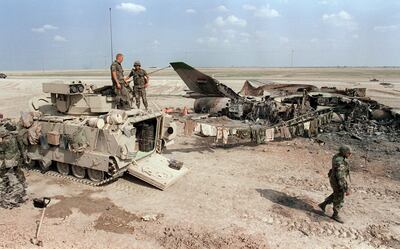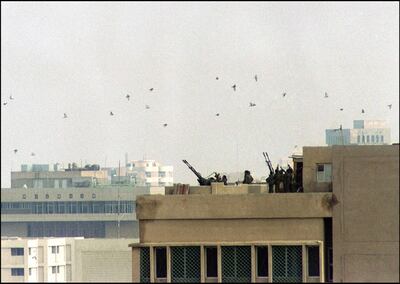The Iraqi military on Monday denied killing two people protesting against a cut in state payments to families who took part in a failed southern revolt against Saddam Hussein nearly three decades ago.
Soldiers shot dead the two men on the outskirts of Baghdad on Sunday, local media reported.
They were among a group from Iraq's mostly Shiite south who were trying to reach the capital's Green Zone, a government district that is mostly off-limits to ordinary Iraqis.
Army spokesman Yehya Rasoul said the military turned away buses full of demonstrators for not adhering to coronavirus restrictions.
The army “repelled" demonstrators who tried to attack security forces, without using ammunition and “without a single casualty”, Mr Rasoul said.
“The security forces are committed to preserve the constitutional rights of peaceful demonstrators,” he said.
The Iraqi government makes monthly payments to thousands of southern Shiites, known as the “Rafha detainees”, under a law to compensate political prisoners from the Saddam era.
They fled southern Iraq to the Rafha area in Saudi Arabia after a failed uprising against the dictator in 1991, and were housed at a camp on the border.
The government has been making the payments since 2006, to the original inhabitants of the camp and their descendants, although many had left the camp by the time Saddam fell in 2003.
Prime Minister Mustafa Al Kadhimi, who took office in May, reduced the payments to one person in each family instead of each member of a household, sparking an outcry from the Rafha community of 150,000 people.
Mr Al Kadhimi said the reductions were part of measures to curb a soaring budget deficit and counter fraud in salaries and welfare payments.

The southern Iraqis revolted as the Gulf War was about to end in February 1991.
They overran southern towns, ousting regime troops and hanging members of Saddam's Baath party from lamp posts.
Saddam crushed the uprising within weeks and his mostly Sunni troops carried out indiscriminate reprisals.
The current Shiite political establishment, which rose to power after the US invasion that toppled Saddam 12 years later, is also facing mass protests centred mainly in the south.
But the Rafha demonstrators differ in their goals. They oppose only Mr Al Kadhimi's decision rather than seeking an overhaul of Iraq's political system.
Government forces and Iran-backed militias have all but crushed the mass uprising that began with peaceful demonstrations in October last year, with hundreds of protesters killed and thousands wounded.
In December, Iraq’s Higher Judicial Council issued an arrest warrant for an Iraqi commander for killing dozens of demonstrators in the southern city of Nasiriyah.
But the warrant was not carried out.
The commander, Gen Jamil Al Shammari, who is aligned with Iran, remains in the military.



